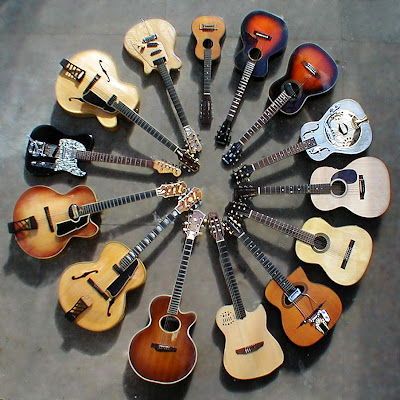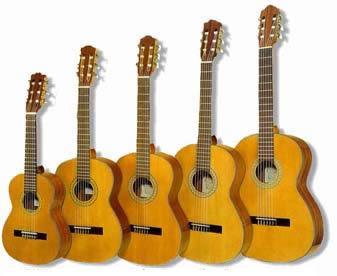(Playing Guitar For Beginners)
Selecting a guitar is first work to play guitar for beginners. The following key issues are critical in selecting your guitar. Having an appropriately sized and adjusted instrument is the best way to start. Each item below will give you new insight and help guarantee your success in accomplishing your musical desires.
Most importantly, only select a guitar you know is fully inspected and adjusted for easy playability, accuracy in tuning, intonation and tone production.
Many important issues rest on the quality and playability of your instrument. Always get the facts. Ask what has been done to make the instrument easy to play. There's no greater impedance to progress, developing proper technique and the enjoyment of learning to play than a poorly constructed instrument or one that's not correctly set up.
Choose the kind of guitar that interests you the most. This way you will be more motivated to play.
Many people mistakenly purchase an inexpensive acoustic guitar when they may really want an electric guitar. Often they're afraid they or their child will not stick with it. This's almost like buying a guarantee for failure. A cheaply made acoustic guitar will certainly lead you to quit because it is physically just too hard to play and coupled with the fact its not what you really wanted in the first place. Also, the technical approach for the electric, acoustic or classical guitar is different. In other words, if you master the acoustic guitar it'll not necessarily translate well to the electric guitar. The next time you go to a concert or watch videos of your favorite bands and performers, notice the technical and musical way the instruments are being played is not the same when an acoustic guitar is being played and when a electric guitar is being played. The chords, notes and scales may look the same but the approach to playing the chords, notes and scales is different. Choose the kind of guitar you're most interested in playing.
This is especially true for children. A guitar that's too large will make it difficult for your child to make the proper reach with both the right and left hands. Having their arm as high as their shoulder to reach over the guitar can become uncomfortable and at worst painful. Over reaching for the first fret puts them at a great technical disadvantage because their muscles are already stretched out making it difficult to properly move their fingers on the fingerboard. Generally, adults are comfortable with full size guitars.
Select a guitar that does not sell at the bottom of the price barrel.
This may seem a little difficult without giving you numbers but the old adage is almost always true, “You get what you pay for”. Sometimes you even get less. As a general rule, cheaply made guitars aren't really playable or adjustable. They aren't worth your time or money.
Avoid guitars and packages that promise to be a tremendous value for an amazingly low price.
The old saying,“ If it sounds to good to be true, it probably is”, is a good guide. You should see red flags when presented with guitar packages valued at $800.00 and selling for only $199.00. The difference between the value and the selling price is too great. If it sells for $199.00 then that is about what it may be worth but not worth buying. The “$800.00 value package” would have to contain cheaply made products to only sell for $199.00. A $289.00 package at $199.00 is a much more realistic price.
Do not fall into the so-called major "Brand Name" trap.
Most major brand name companies compete with minor brand name companies for the entry and intermediate level player. Smaller brand name companies rely less on media advertising and more on dealer support and knowledge. These companies may even specialize in the entry and intermediate entry levels where as the major brands specialty is higher priced professional instruments. Obviously the cost of media advertising is included in the overall cost of the instrument. You may end up paying more for the brand name while the quality's the same or paying a competitive price for an instrument of less quality. A brand name guitar does not guarantee it to be a better guitar. As a side note, many major brand guitar makers provide free guitars to recording artist to use in concert, which's a very effective marketing tool. The fans that play guitar or want to begin playing the guitar associate the name brand with their favorite performers, not realizing that the expensive instruments they use share very little (except the name) with the entry level models.
Having a guitar that not only plays and sounds well but also appeals to you visually can greatly contribute to your motivation to play and practice.
Be sure to include an electronic tuner when you select your guitar.
A tuner is about as important as having picks and strings. Keeping your guitar tuned to standard pitch is important for several reasons. First, guitars're manufactured and set-up to withstand the tension of standard pitch, which produces the best musical tone. Second, guitars are initially set-up and adjusted for standard pitch and third, standard pitch is the musical standard for most instruments. If your guitar is tuned too high above standard pitch the excessive tension can damage your instrument and at the very least break your strings. As opposed to excessively high tension, allowing your guitar to fall too far below standard pitch can cause the neck to move backward resulting in unacceptable string buzz against the frets. This can usually be remedied by tuning back to standard pitch and if necessary, by re-adjusting the truss rod.
A guitar tuner contributes to ear training.
 |
| Playing Guitar For Beginners - Electronic guitar tune |
But perhaps most importantly, a guitar tuner actually helps you develop your musical ear much more quickly than learning to tune by ear alone. A guitar tuner saves valuable time and frustration so you can stay focused on your music. Learning to tune your guitar by ear is a trial and error method largely due to the fact the ear has not been trained to selectively detect slight pitch changes between matching tones during the tuning process. Often your guitar will seem reasonably tuned when in fact it may not be. You may not even tune your guitar as often because it seems OK. The problem's your ear becomes accustomed to less than adequate tuning which prolongs your ear training development. When you use a tuner daily your ear quickly becomes accustomed to accurate tuning and you're more apt to notice when your guitar is even slightly out of tune. As a result your ears develop much more quickly.














